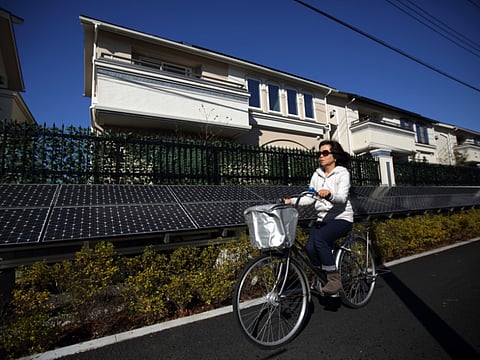Japan-GCC: A renewable partnership
Changing economic conditions, a new energy focus alter an old trade relationship

Japan is the world’s third-largest economy, but it has one problem — a scarcity of energy resources. Good trade relations between the nation and oil- and gas-exporting countries in the GCC are essential towards maintaining Japan’s technological and industrial development.
The country provides the GCC with industrial and trade goods and has emerged as an important partner in several sectors. Japan imports 34 per cent of its crude oil from Saudi Arabia, 24 per cent from the UAE, 11 per cent from Qatar and 7 per cent from Kuwait. Similarly, but to a smaller extent, the GCC is also an important supplier of liquefied natural gas (LNG) to Japan, namely through the UAE, Qatar and Oman.
“Especially after the 2011 Fukushima nuclear disaster, Japan has become increasingly reliant on the Gulf’s liquefied natural gas,” Giorgio Cafiero, CEO of US-based geopolitical risk consultancy Gulf State Analytics, and Daniel Wagner, CEO of Country Risk Solutions, wrote in a report.
Shifting trade balance
In Qatar, Japanese companies are broadly engaged in the construction of infrastructure projects in preparation for the 2022 Fifa World Cup.
With the UAE, Japan has decades-old trade relations that started with oil imports as early as the 1970s. Today, Japan is among the top five sources for foreign direct investment in the UAE, and bilateral trade stood at $51 billion (Dh187 billion) in 2014 with Japan mainly importing oil, gas, aluminium (the UAE is Japan’s top supplier), metals, chemicals and precious stones, while the UAE imported mainly vehicles, machinery, electrical and electronic goods, rubber, textiles, as well as iron and steel from Japan.
However, due to both the decline in the exchange rate of the yen and the drop in oil prices, bilateral trade in the first half of 2015 — as per latest figures provided by the Dubai chapter of the Japan External Trade Organisation (Jetro) — was valued at $16.25 billion.
Masami Ando, Jetro Dubai Managing Director, says Japan is looking into other fields of trade and knowledge exchange, which include food exports from Japan, where manufacturers are increasingly turning towards the production of halal food, as well as cooperation in production of medical devices, in renewable energy, nuclear safety and even space technology.
At a recent reception, Kanji Fujiki, Japanese Ambassador to the UAE, also emphasised that future cooperation between the countries would go beyond the dominant oil and gas trade.
“We are looking into strengthening cooperation in various other fields such as education, science, technology, health, tourism, finance, culture, sports and many others.”
New education and scientific cooperation include a recent agreement between Tokyo University and the Petroleum Institute Abu Dhabi to launch joint research, as well as increase student exchange programmes.
For renewables, Japanese expertise could also be useful. “Japan has pioneering experience in the field of energy efficiency, while new energy trends in the GCC include more energy-efficient buildings, district cooling and smart grids,” Nasser Al Tamimi, Energy Researcher at Doha-based Al Jazeera Centre for Studies, wrote in a November report, Japanese-Gulf relations: What’s next after Energy?
“These trends increasingly affect the direction of their energy policy. It is likely that the Gulf countries will allocate billions of dollars for renewable energy projects in the coming years, and this in turn would open the way for Japanese companies to invest and develop relations in this new sectors in the region.”
Regional hub
Japanese companies generally use Dubai and Abu Dhabi as hubs for their activities across the region. Including the ubiquitous car companies, around 400 Japanese firms have a presence in the UAE, some 280 in Dubai. Among them are big names such as electronics manufacturers Panasonic, Sony, Sharp and Toshiba, a number of engineering companies such as Hitachi’s unit which was involved in the construction of landmarks such as the Burj Khalifa and the Dubai Metro, as well as Fujifilm Medical Systems. To promote cooperation in the latter sector, Jetro in January brought 14 other medical device companies, including Daiichi and Mitsubishi, to the Arab Health exhibition in Dubai.
On the food security front, Kuwait-based Gulf Investment Corporation (GIC) in cooperation with Japanese Mizuho Bank and Norinchukin Bank in October launched the Gulf Japan Food Fund, which is aimed at supporting Japanese food and agribusiness in the GCC and bolstering the region’s food security plans.
“We are looking into the transfer of Japanese experience and know-how in the food sector, the use of technology for optimal utilisation of funds and other critical resources such as water in support of food investments in GCC countries,” Ibrahim Al Qadhi, CEO of GIC, said in a statement.
The driving force behind the fund is Oman’s biggest sovereign wealth fund, the State General Reserve Fund, which — together with the Japanese banks — will provide $400 million for the project.



